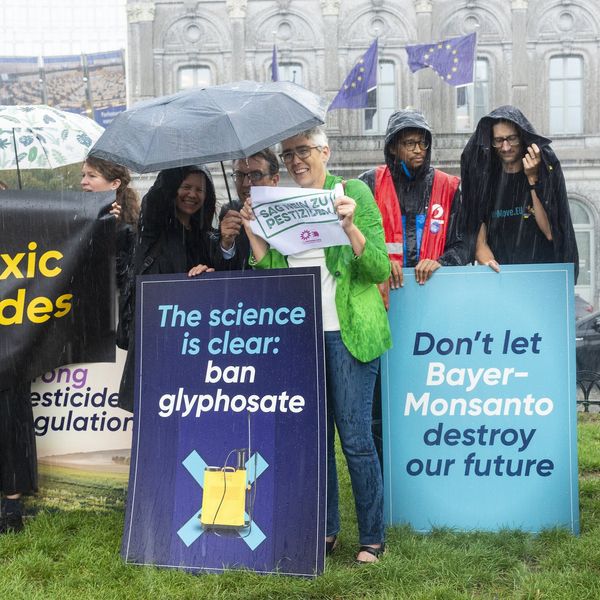Just one week of an organic diet effectively reduces levels of the herbicide glyphosate in pregnant women’s urine, according to a study published in July in Environmental Health Perspectives.
The average reduction ranged from 25% to 30% and rose to 43% after the researchers excluded participants who did not perfectly comply with an all-organic diet.
Glyphosate, the active ingredient in the weedkiller RoundUp, is the most widely used pesticide in U.S. agriculture. Eighty percent of Americans have detectable levels of the chemical in their urine. Exposure to glyphosate may pose particular risks during pregnancy. Past research has linked the herbicide to premature birth and low birth weights — both of which are associated with higher infant mortality and developing a range of diseases later in life.
“For most people who live far from agricultural fields, consuming an organic diet can significantly and immediately reduce exposure to glyphosate,” study author and director of the Agricultural Health Lab at Boise State University Cynthia Curl told EHN.
But there’s a catch. The study was divided into two groups: urban women living far from croplands and rural women living close to them — often as close as across the street. For the rural participants, the spread of glyphosate from sprayed fields drowned out any benefits from the organic diet. “That really surprised me,” Curl said. “There really was no difference in exposure based on diet for the women who lived very close to agricultural fields.”
In a commentary about the new study, Alison Connolly, a pesticide exposure researcher at University College Dublin in Ireland, and Holger Koch, a toxicologist at Germany’s University of Ruhr Bochum, noted that, for the urban woman, their source of exposure during the organic week remains unknown. Participants may have eaten non-organic items, they speculated, or been exposed to glyphosate residues from organic food or outside sources. This, Connolly and Koch said, “suggests that avoiding exposure is challenging, even under the most ideal settings.”
Organic diets for pregnant people

“For most people who live far from agricultural fields, consuming an organic diet can significantly and immediately reduce exposure to glyphosate."
Credit: Unsplash+
For the study, Curl and her collaborators analyzed daily urine samples from 40 pregnant women living in rural and urban parts of Idaho. Each woman ate one week of a conventional diet and one week of an organic diet. This study is part of a larger research project tracking pregnant participants over a year, measuring glyphosate levels before, during and after the spraying season.
Related: Glyphosate, explained
“There were really big data gaps regarding how much an organic diet can reduce overall exposure to those living in rural versus urban areas,” Carly Hyland, a study author and environmental epidemiologist at the University of California, Berkeley, told EHN. “Previous studies have looked almost exclusively at people living in cities.” On top of this, she said, this study is one of the few that focused on glyphosate exposure in pregnant humans instead of lab animals.
While the sample size was relatively small, Connolly and Koch note that few other glyphosate studies have tested the herbicide’s levels for multiple days in a row, rather than just once — offering more data points than the norm. However, according to their commentary, the results only rose to statistical significance after the researchers excluded participants who reported eating conventional foods during the organic week.
Glyphosate controversy and health risks

Tens of thousands of lawsuits have been filed by people claiming that Roundup and other glyphosate-based herbicides caused their cancer.
Credit: Mike Mozart/flickr
Glyphosate kills plants and microbes by interfering with protein synthesis. The chemical is used to control weeds and to kill and dry out crops such as wheat, beans and oats before harvest.
For years, the weedkiller has been embroiled in controversy, perhaps most notably around its potential to cause cancer in humans. The U.S. Environmental Protection Agency has concluded glyphosate is not linked to cancer, while the World Health Organization has taken the opposite tack, classifying the herbicide as a probable carcinogen. A 2019 analysis found that exposure to glyphosate raises the risk of non-Hodgkin’s lymphoma by 41%. In 2020, Bayer offered $10.9 billion to settle thousands of Roundup-related cancer lawsuits from agricultural workers, landscapers and gardeners.
This essay is also available in Spanish
“For a chemical that has been used for so long and in such high quantities worldwide, one would expect an abundance of data,” the authors of the commentary noted. “This is contrary to the case.”
While glyphosate came to market in the 1970s, it wasn’t until the widespread adoption of genetically modified, glyphosate-resistant crops in the late 1990s that the herbicide’s popularity exploded, Curl said. “It takes a while to catch up with that.” The chemical also has low acute toxicity, fostering “a perhaps unwarranted feeling of safety.” Rather than lab animals or agricultural workers immediately sickening or dying after high levels of exposure, she said, the potential health effects, such as increased cancer risk, are longer term and more subtle.
Another factor, Curl said, is that glyphosate acts on a chemical pathway found in plants, but not in humans and other animals — leading, again, to a potentially false sense of security. “Glyphosate doesn't stand alone in the idea that a potential mechanism of harm may not be the mechanism of action in pest management,” she said. She gave the example of the pesticide chlorpyrifos, which harms both humans and insects, but in different ways. As for glyphosate, experimental evidence suggests that it triggers oxidative stress in animals, heightening the risk for cancer, DNA damage and reproductive harms.
The benefits of eating organic
Fortunately for both pregnant and non-pregnant people, glyphosate’s presence in the body is short-lived. After a few hours to a few days, most of the chemical is excreted. The problem, however, is that most people are continually exposed to glyphosate via food, lawns and fields that have been sprayed with Roundup, and other avenues.
“If exposure to pesticides is something that you are concerned about,” Curl said, “I think we have enough evidence to suggest that eating an organic diet is an effective way to reduce that exposure.” However, given that organic food is often pricier and harder to access, this is far from a perfect fix, she acknowledges. What’s needed, she said, are regulations to protect everyone’s health, regardless of what food they do eat.
For Hyland, the benefits of an organic diet go beyond protecting the diner’s health. “Even if I can't say with complete certainty that an eating an organic diet is going to provide a health benefit to me,” Hyland said, “we know that farming without pesticides is definitely better for farmworkers … that's really where I try to prioritize organic, and try to encourage others to as well.”
- Analysis: Glyphosate exposure trends demand a public health driven response ›
- Prenatal exposure to toxics risks delay of child’s brain development ›
- Kids’ glyphosate exposure linked to liver disease and metabolic syndrome ›
- Glyphosate, explained ›
- Glyphosate exposure linked to lower birth weights for Indiana babies ›
- Glyphosate linked to shorter pregnancies in Indiana women ›
- Study finds link between glyphosate exposure and pregnancy length ›
- Understanding how the environment affects pregnant people’s health - EHN ›
- Glyphosate on trial - EHN ›



























